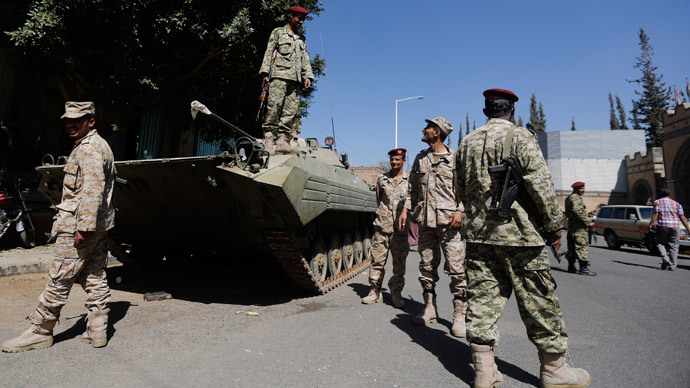‘Military intervention in Yemen would be like throwing oil in flames’

The UN should put pressure on the Gulf Cooperation Council not to militarily intervene in Yemen, as there is already a spreading conflict around the region and it would only further deteriorate the situation, Gerald Horne, author and historian, told RT.
RT:The UN was repeatedly warning Yemen is heading towards disintegration when Shia Houthi rebels grabbed power. Is that what we're seeing now?
Gerald Horne: I’m afraid so. The news is getting worse with every passing moment. The latest is that the Saudis and their allies in the Gulf Cooperation Council are considering a military intervention in Yemen. This could be like throwing oil on flames. You all know that the Saudis are concerned that the Houthi rebels who have taken control of Yemen are all too close to the Saudis primary antagonist, that is to say Iran. The Saudis as is typical of them are quite lethargic about the prospect of ousting the Houthis in Yemen and seeing the al-Qaeda on the Arabian Peninsula come to power. The situation is deteriorating with every passing moment.
RT:With al-Qaeda an active force in Yemen, how much danger does the chaos there pose for the whole region?
GH: It is extremely dangerous. The Houthis as you know are heartily opposed to al-Qaeda on the Arabian Peninsula. The Houthis also have certain conflict with the US and Israel. The question for the US and the North Atlantic powers is this: Will they stand with the Houthis because they see them as a barrier to the rise of al-Qaeda in Yemen? The answer to that question is unclear at this moment
RT:What could be done in this situation?
GH: I would urge the UN Security Council to go back to the drawing board. It is unclear to me if the Houthis will relinquish power. It is also unclear if the president who they deposed will be willing to return the power which in a sense makes the UN Security Council resolution a nullity. I would also encourage the authorities at the UN to put pressure on the Saudis and their allies in the Gulf Cooperation Council not to intervene militarily. If you step back for the moment and look at the region, you now see that the Egyptians have intervened militarily in neighboring Libya because of the beheadings of Egyptian citizens in Libya. We see that in Iraq that the Jordanians have been joined by the United Arab Emirates in bombing Islamic State forces in Iraq. There is a spreading conflict around that region and military intervention is not the way to go.
RT:Eleven nations have closed their embassies in Yemen. What impact will this have on international efforts to find a solution?
GH: The withdrawal of these embassies, particularly of the embassy of the United States will complicate the attempt to find peace in Yemen. It seems to me that peace would be better served if embassies were not withdrawn. Although I certainly understand the fear that they have about kidnappings and other dangers.
‘If there is no internal mediated settlement there could be outside intervention’
With Houthi rebels on the one hand, and pro-presidential forces on the other, there could be an escalating internal conflict in Yemen as well as outside intervention, says Abayomi Azikiwe, editor of the Pan-African News Wire.
“[Yemen] was divided up until about 25 years ago. In the south, the separatist movement is gaining strength; they want the restoration of the People’s Democratic Republic of Yemen which had a socialist orientation back during the period prior to the 1990s. At the same time, there are other forces opposed to the Shia-dominated Houthi movement who want the restoration of President Hadi. It’s a very serious situation taking place right now.”
Abayomi Azikiwe says the UN will not be capable of intervening militarily in the short-term. Thus “it leaves it somewhat open for the Gulf Cooperation Council to enact some type of invasion. They have done it in the past when there was unrest several years ago and has the potential for to take place again”.
Of course the countries that have withdrawn their embassies from Yemen are concerned about their diplomatic staff inside the country, Mr. Azikiwe added. However he says that at the same time this withdrawal does put pressure on various forces inside the country to reach some type of internal agreement.
“It makes it more difficult because the Shia population, which historically has been oppressed in Yemen, now is in a position particularly in the capital Sana’a where they can exercise some authority but it’s going to be difficult for them to maintain their authority if they have this rising opposition particularly among people in the south who are demanding succession, and also supporters of President Hadi who are from the Sunni community who are backed at least tactically by the Gulf Cooperation Council.”
The statements, views and opinions expressed in this column are solely those of the author and do not necessarily represent those of RT.
The statements, views and opinions expressed in this column are solely those of the author and do not necessarily represent those of RT.












